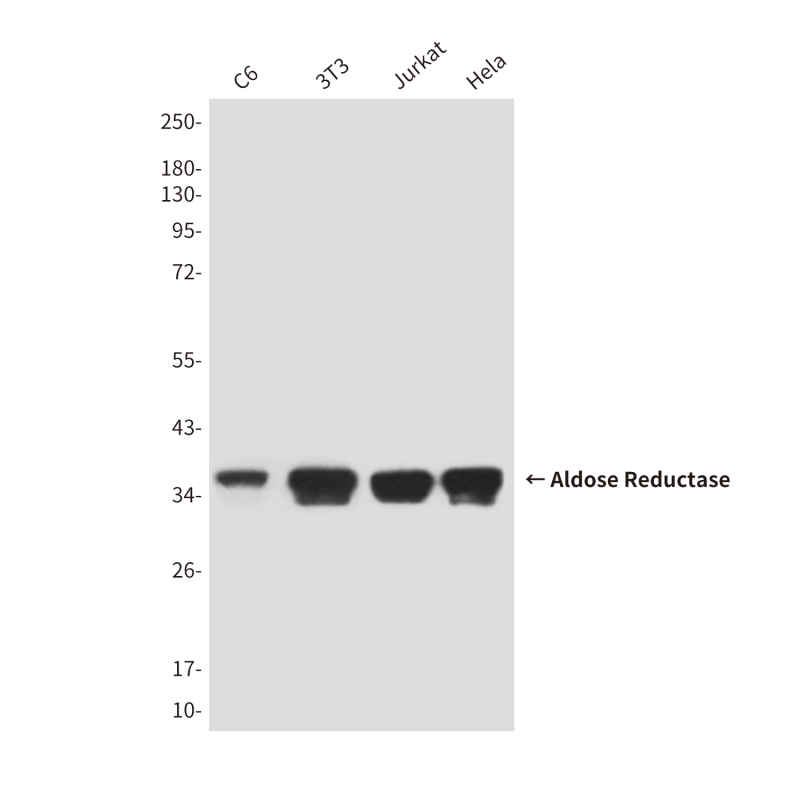
| WB | 咨询技术 | Human,Mouse,Rat |
| IF | 咨询技术 | Human,Mouse,Rat |
| IHC | 咨询技术 | Human,Mouse,Rat |
| ICC | 技术咨询 | Human,Mouse,Rat |
| FCM | 咨询技术 | Human,Mouse,Rat |
| Elisa | 咨询技术 | Human,Mouse,Rat |
| Aliases | AR; ADR; ALR2; ALDR1 |
| Entrez GeneID | 231 |
| clone | 7G9 |
| WB Predicted band size | Calculated MW: 36 kDa; Observed MW: 36 kDa |
| Host/Isotype | Mouse IgG1 |
| Antibody Type | Primary antibody |
| Storage | Store at 4°C short term. Aliquot and store at -20°C long term. Avoid freeze/thaw cycles. |
| Species Reactivity | Human,Mouse,Rat |
| Immunogen | Purified recombinant human AKR1B1 protein fragments expressed in E.coli. |
| Formulation | Purified antibody in PBS with 0.05% sodium azide,0.5%BSA and 50% glycerol. |
+ +
以下是关于Aldose Reductase(AR)抗体的3篇参考文献及其简要摘要:
---
1. **文献名称**:*"Aldose reductase: a novel therapeutic target for diabetic complications"*
**作者**:Srivastava SK, Ramana KV, Bhatnagar A
**摘要**:该研究探讨了AR在糖尿病并发症(如视网膜病变和神经病变)中的作用,利用AR抗体检测其在糖尿病大鼠模型中的表达上调,证实AR通过多元醇通路导致氧化应激和细胞损伤。
---
2. **文献名称**:*"Role of aldose reductase in inflammatory signaling in human cells"*
**作者**:Ramana KV, Srivastava SK
**摘要**:研究通过Western blot和免疫荧光(使用AR抗体)发现,AR激活会促进炎症因子(如TNF-α、IL-6)的表达,并增强NF-κB信号通路,提示AR是炎症相关疾病的潜在治疗靶点。
---
3. **文献名称**:*"Natural inhibitors of aldose reductase: a mechanistic insight through antibody-based assays"*
**作者**:Yadav UCS, Demaine AG
**摘要**:该文献筛选了多种天然化合物(如槲皮素)对AR的抑制作用,利用AR抗体进行酶活性检测和免疫印迹,发现类黄酮可通过竞争性抑制减少山梨醇积累,缓解糖尿病并发症。
---
4. **文献名称**:*"Post-translational modification of aldose reductase by O-GlcNAcylation modulates its activity"*
**作者**:Chung SSM, Ho ECM
**摘要**:通过免疫沉淀(使用AR特异性抗体)和质谱分析,研究发现AR的O-GlcNAc修饰可增强其酶活性,揭示高血糖环境下翻译后修饰对AR功能调控的机制。
---
**备注**:以上文献为领域内代表性研究,AR抗体的应用集中在检测表达水平、活性调控及疾病机制探索。如需具体文献来源,建议通过PubMed或期刊数据库查询作者名+关键词获取全文。
**Background of Aldose Reductase Antibody**
Aldose reductase (AR), encoded by the *AKR1B1* gene, is a NADPH-dependent enzyme that catalyzes the reduction of glucose to sorbitol in the polyol pathway. It plays a key role in metabolizing toxic aldehydes and is implicated in diabetic complications, such as neuropathy, retinopathy, and nephropathy, due to its involvement in osmotic stress and oxidative damage under hyperglycemic conditions. AR overexpression is also linked to inflammatory diseases, cancer, and neurodegenerative disorders, making it a therapeutic target.
Antibodies against aldose reductase are essential tools for detecting and quantifying AR expression in research and diagnostics. These antibodies are widely used in techniques like Western blotting, immunohistochemistry (IHC), and immunofluorescence (IF) to study AR localization, regulation, and interaction with inhibitors in cell and tissue samples. Their specificity enables researchers to explore AR's role in disease mechanisms, validate gene knockout models, and assess therapeutic interventions targeting AR activity.
Commercial AR antibodies are typically raised in hosts like rabbits or mice using purified recombinant human or rodent AR proteins. Validation includes testing for cross-reactivity, sensitivity, and application-specific performance. Reliable AR antibodies are critical for advancing studies on metabolic disorders, diabetic complications, and AR inhibitor development, bridging experimental insights with clinical applications.
×